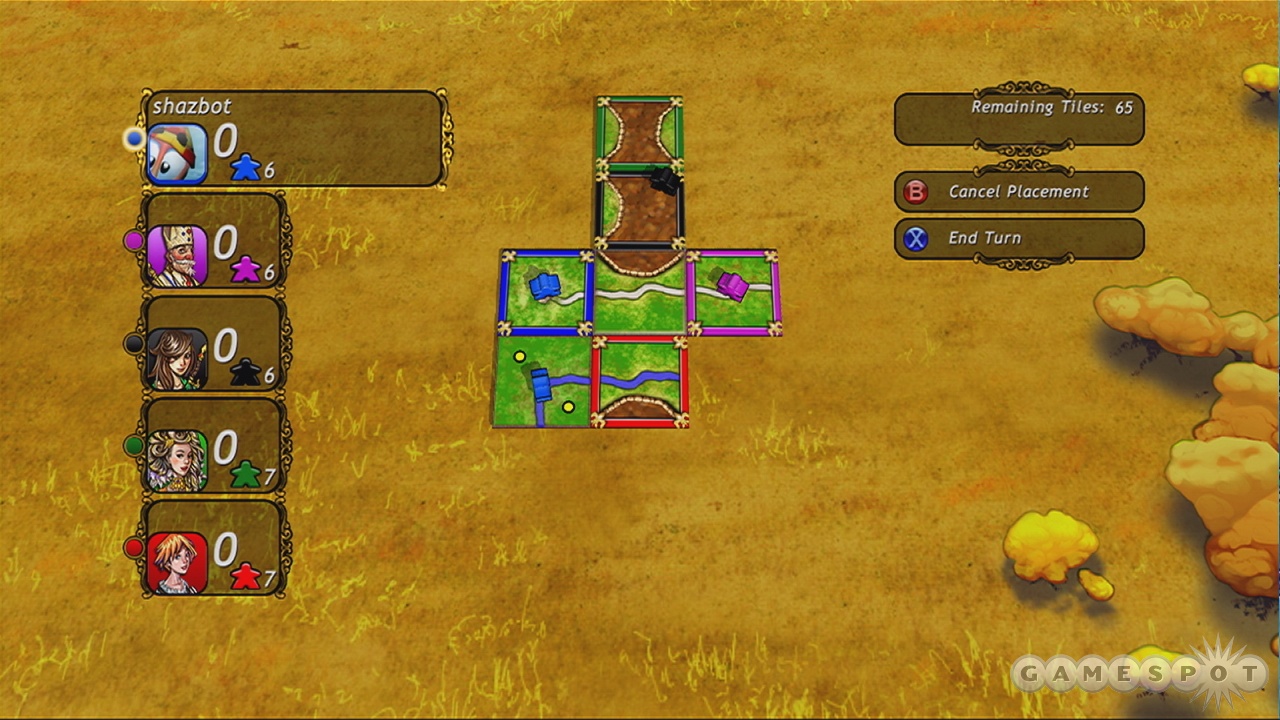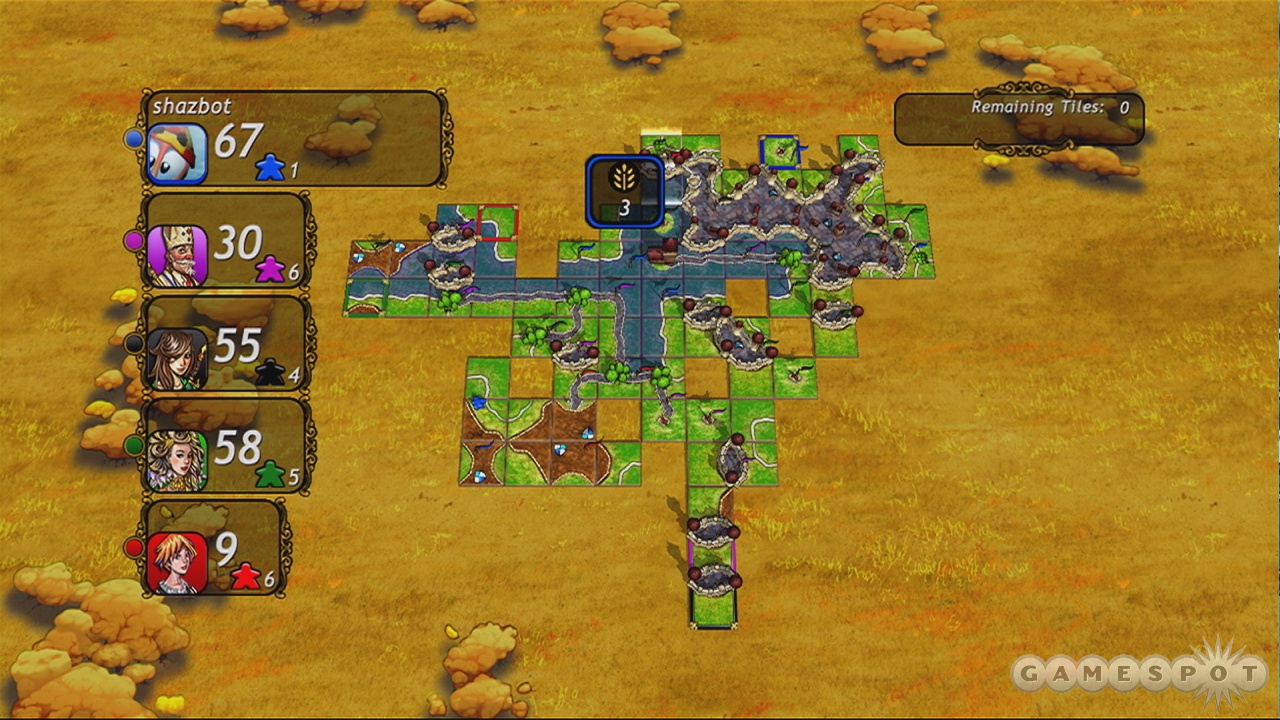Following the successful translation of classic German board game Catan to the Xbox Live Arcade comes Carcassonne, another classic German board game revamped for Xbox 360 owners. However, unlike Catan, Carcassonne's strategic gameplay doesn't require the patient type to appreciate. It's a quickly paced game that has you building cities, roads, monasteries, and farmlands by placing tiles strategically across a game board. Like Catan, Carassonne is a rather dry interpretation of the game, going light on the bells and whistles found in many other Live Arcade downloads. But the addictive strategy of the gameplay is undeniable, and the online support for up to five total players gives the game plenty of legs.
Incidentally, Carassonne isn't a game that's terribly difficult to pick up if you've never played it before. Even if you don't partake of the helpful tutorials the game provides, you can jump into a few easy matches against the computer and get a feel for the basics. The game is turn-based, and on each turn, you're dealt one of more than 70 different tiles. These tiles contain varieties of terrain, from pieces of land that can be used for city construction, road pieces, and field sections for farms to monasteries. Building objects simply requires you to put enough pieces together with enclosed borders. For example, a city can continue being built endlessly if you don't put enough end pieces on to enclose it, and you don't earn as many points for an unfinished city as you do for a completed one.

However, there's a catch to all of this: You can't just claim anything you build. To lay claim to a city, road, or anything else, you have to place a follower, which is a color-coded piece that marks your territory. Each player gets a limited number of followers to use, so the strategy then becomes to keep close track of how many followers you have left before adding one to yet another piece of the scenery. You do get followers back for completing cities and book-ending roads, so it's hard to run out of them quickly.
Carcassonne also provides some rule variants to mess with; you can adjust point scoring, which types of pieces can be built in the game, and there's even an expansion included with the game known as The River. The River is what it sounds like. The first several turns of the game are spent building a river down the playing field. Along the way, chunks of road and city will come along with these river pieces, which you can claim. Once the river is fully built, it's back to play as normal.
Part of the reason Carcassonne is so immediately satisfying is that it's the sort of game you can actually win without realizing it. There are so many different ways to earn points that it's not tough to place something somewhere without thinking and get a bunch of points for it. For instance, creating a farm is as simple as placing a follower on a section of field. Any connected field areas then become part of that farm, and any cities built in that area are connected to those farms; thus, they earn you extra points at the end of the game. However, the farmland areas are separated by roads, and sometimes creating a farm early in the game has unforeseen results as more tiles are laid. In multiple situations, we accidentally won games simply by placing followers on various pieces of farmland early on, and then over time, that farm land grew without our realizing it, earning us a ton of points. Once you actually get a grip on the intricacies of the game, those accidental wins become more purposeful, and you might even lose on occasion too.
That's especially true if you opt to play against multiple opponents. Carcassonne is playable with as few as two and as many as five players. Two and even three player matches aren't terribly difficult if you know what you're doing, but when four or five players enter the mix, the game becomes a mad dash to claim every scrap of land. That's because the number of tiles available in the game doesn't change as you add players, so it's all you can do to grasp onto whatever you can. Adding more players also shortens up the game significantly because it's less about carefully plotting moves and more about just making sure you can connect onto something that hasn't been claimed. With that said, the game is probably a bit more fun with two to three players, but the four-to-five-player range is amusing in its own right.
By the same token, playing against opponents on Xbox Live or even a single console (single-console play is limited to four players) is markedly more fun than playing against the artificial intelligence. Only the expert-level-difficulty level offers a consistent challenge in most situations; you can pretty much bowl over the easy and medium difficulty levels every time if you have some semblance of what you're doing. It's a good thing the online play works well. We ran into some issues connecting to a few games hosted by other players, but any time we hosted a game, it would work perfectly.

If Carcassonne has any flaw to speak of, it's its presentation. It's not that the game looks awful or anything because the game's graphical prowess is about on par with what Catan offered. The main issue is that the board can sometimes be difficult to make out in certain spots. As the board gets choked with more tiles, the camera zooms back further and further, sometimes making it tough to see where followers have been placed on the board, especially on SDTV screens. Fortunately, you can zoom the camera in whenever you like to get a closer look at the board, but you may find yourself zooming in and out more often than you'd probably like. The game's soundtrack is also quite irritating, consisting of the same short, annoying medieval musical loop over and over during gameplay. Fortunately, you can turn it off.
All things considered, Carcassonne is a solid addition to Live Arcade's slowly increasing library of board games. It isn't quite as deep or enthralling as something like Catan, but on the flipside, it's a much easier game to grasp and still contains plenty of strategic gameplay into which you can sink your teeth. If you enjoyed Catan or are at least interested in the notion of a simple-but-effective board game over Xbox Live, Carcassonne is worth checking out.